
Alfred Elton van Vogt was an American science fiction writer. His fragmented, bizarre narrative style influenced later science fiction writers, notably Philip K. Dick. He was one of the most popular and influential practitioners of science fiction in the mid-twentieth century, the genre's so-called Golden Age, and one of the most complex. The Science Fiction Writers of America named him their 14th Grand Master in 1995.

Fritz Reuter Leiber Jr. was an American writer of fantasy, horror, and science fiction. With writers such as Robert E. Howard and Michael Moorcock, Leiber is one of the fathers of sword and sorcery.
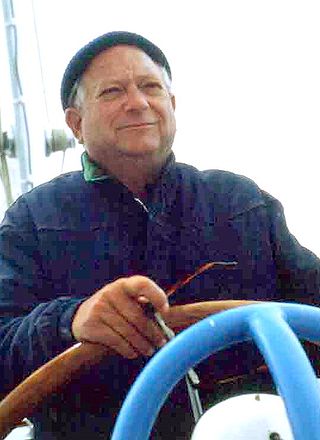
John Holbrook Vance was an American mystery, fantasy, and science fiction writer. Though most of his work has been published under the name Jack Vance, he also wrote several mystery novels under pen names, including Ellery Queen.

Gene Rodman Wolfe was an American science fiction and fantasy writer. He was noted for his dense, allusive prose as well as the strong influence of his Catholic faith. He was a prolific short story writer and novelist, and won many literary awards. Wolfe has been called "the Melville of science fiction", and was honored as a Grand Master by the Science Fiction and Fantasy Writers of America.

Rudolf von Bitter Rucker is an American mathematician, computer scientist, science fiction author, and one of the founders of the cyberpunk literary movement. The author of both fiction and non-fiction, he is best known for the novels in the Ware Tetralogy, the first two of which both won Philip K. Dick Awards. He edited the science fiction webzine Flurb until its closure in 2014.

Robert Anthony Salvatore is an American author best known for The Legend of Drizzt, a series of fantasy novels set in the Forgotten Realms and starring the character Drizzt Do'Urden. He has also written The DemonWars Saga, a series of high fantasy novels; several other Forgotten Realms novels; and Vector Prime, the first novel in the Star Wars: The New Jedi Order series. He has sold more than 15 million copies of his books in the United States alone, and 22 of his titles have been New York Times best-sellers.
Daryl Furumi Mallett is an American author, editor, publisher, actor, producer and screenwriter.
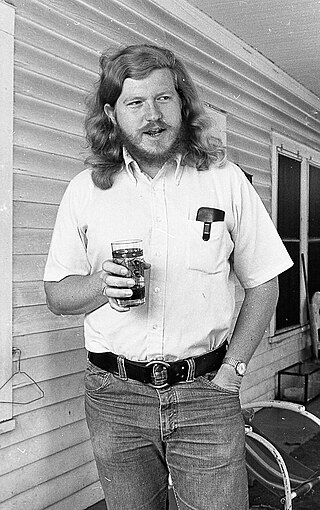
Karl Edward Wagner was an American writer, poet, editor, and publisher of horror, science fiction, and heroic fantasy, who was born in Knoxville, Tennessee and originally trained as a psychiatrist. He wrote numerous dark fantasy and horror stories. As an editor, he created a three-volume set of Robert E. Howard's Conan the Barbarian fiction restored to its original form as written, and edited the long-running and genre-defining The Year's Best Horror Stories series for DAW Books. His Carcosa publishing company issued four volumes of the best stories by some of the major authors of the so-called Golden Age pulp magazines. He is possibly best known for his creation of a series of stories featuring the character Kane, the Mystic Swordsman.

Unknown was an American pulp fantasy fiction magazine, published from 1939 to 1943 by Street & Smith, and edited by John W. Campbell. Unknown was a companion to Street & Smith's science fiction pulp, Astounding Science Fiction, which was also edited by Campbell at the time; many authors and illustrators contributed to both magazines. The leading fantasy magazine in the 1930s was Weird Tales, which focused on shock and horror. Campbell wanted to publish a fantasy magazine with more finesse and humor than Weird Tales, and put his plans into action when Eric Frank Russell sent him the manuscript of his novel Sinister Barrier, about aliens who own the human race. Unknown's first issue appeared in March 1939; in addition to Sinister Barrier, it included H. L. Gold's "Trouble With Water", a humorous fantasy about a New Yorker who meets a water gnome. Gold's story was the first of many in Unknown to combine commonplace reality with the fantastic.
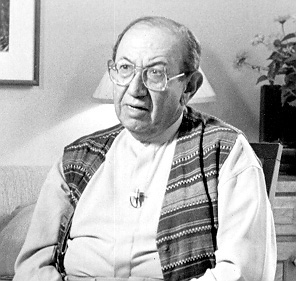
Daniel Keyes was an American writer who wrote the novel Flowers for Algernon. Keyes was given the Author Emeritus honor by the Science Fiction and Fantasy Writers of America in 2000.

Manly Wade Wellman was an American writer. While his science fiction and fantasy stories appeared in such pulps as Astounding Stories, Startling Stories, Unknown and Strange Stories, Wellman is best remembered as one of the most popular contributors to the legendary Weird Tales and for his fantasy and horror stories set in the Appalachian Mountains, which draw on the native folklore of that region. Karl Edward Wagner referred to him as "the dean of fantasy writers." Wellman also wrote in a wide variety of other genres, including historical fiction, detective fiction, western fiction, juvenile fiction, and non-fiction.
Ian Irvine is an Australian fantasy and eco-thriller author and marine scientist. To date Irvine has written 27 novels, including fantasy, eco-thrillers and books for children. He has had books published in at least 12 countries and continues to write full-time.
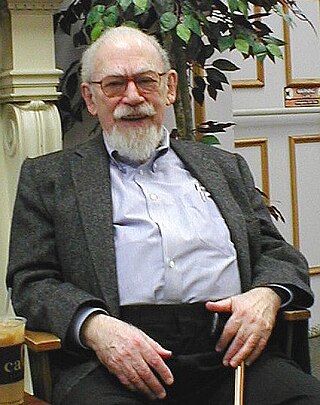
William Tenn was the pseudonym of Philip Klass, a British-born American science fiction author, notable for many stories with satirical elements.
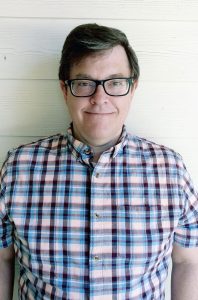
Jess Nevins is an American author and research librarian best known for annotated guides and encyclopedias covering Victoriana, comic books, genre fiction and pulp fiction. Among Nevin's books are Encyclopedia of Fantastic Victoriana,Horror Fiction in the 20th Century and Encyclopedia of Golden Age Superheroes. He has been a recipient and finalist for a number of honors, including the World Fantasy, Sidewise, and Locus Awards.

Man from Mundania is a fantasy novel by American writer Piers Anthony. The twelfth book of the Xanth series, it concludes the trilogy of Vale of the Vole and Heaven Cent.
Worldbuilding is the process of constructing an imaginary world or setting, sometimes associated with a fictional universe. Developing the world with coherent qualities such as a history, geography, culture and ecology is a key task for many science fiction or fantasy writers. Worldbuilding often involves the creation of geography, a backstory, flora, fauna, inhabitants, technology and often if writing speculative fiction, different peoples. This may include social customs as well as invented languages for the world.
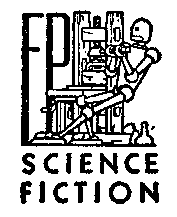
Fantasy Press was an American publishing house specialising in fantasy and science fiction titles. Established in 1946 by Lloyd Arthur Eshbach in Reading, Pennsylvania, it was most notable for publishing the works of authors such as Robert A. Heinlein and E. E. Smith. One of its more notable offerings was the Lensman series.
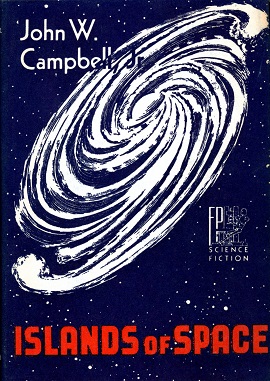
Islands of Space is a science fiction novel by American writer John W. Campbell It was first published in book form in 1957 by Fantasy Press in an edition of 1,417 copies. The novel originally appeared in the magazine Amazing Stories Quarterly; the text was "extensively edited" for book publication, with Campbell's approval, by Lloyd Arthur Eshbach. A paperback edition was published by Ace Books in 1966. In 1973, Islands was included in a Doubleday omnibus of all three "Arcot, Wade, and Morey" novels. A German translation appeared in 1967 as Kosmische Kreuzfahrt, and an Italian translation was published in 1976 as Isole nello spazio.
Danielle Ackley-McPhail is an American author and editor, as well as publisher of fiction, and is best known for her work in speculative fiction. She was the editor for the Bad-Ass Faeries, which was a finalist for the Dream Realm Award for best anthology, and her novel Tomorrow's Memories was a finalist for the 2008 Dream Realm Award for best fantasy. Bad-Ass Faeries 3: In All Their Glory won the best anthology at the 2011 EPIC award for best eBook anthology.

Between 1952 and 1954, John Raymond published four digest-size science fiction and fantasy magazines. Raymond was an American publisher of men's magazines who knew little about science fiction, but the field's rapid growth and a distributor's recommendation prompted him to pursue the genre. Raymond consulted and then hired Lester del Rey to edit the first magazine, Space Science Fiction, which appeared in May 1952. Following a second distributor's suggestion that year, Raymond launched Science Fiction Adventures, which del Rey again edited, but under an alias. In 1953, Raymond gave del Rey two more magazines to edit: Rocket Stories, which targeted a younger audience, and Fantasy Magazine, which published fantasy rather than science fiction.















